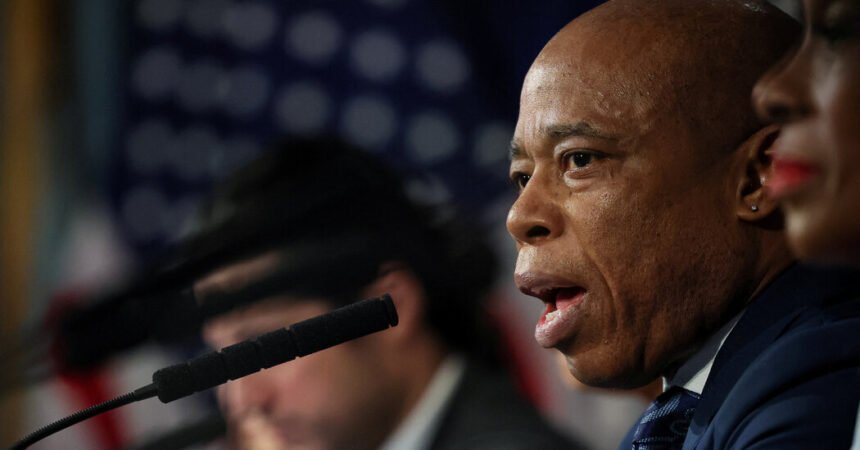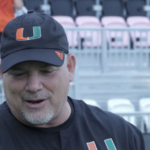New York City once sold a promise of free prekindergarten for all as an unusual benefit designed to make it far easier to raise children in this expensive city.
So as families worried over whether their 3-year-olds would have spots this fall, Mayor Eric Adams pledged last month that everyone would have “access” to a seat. But when the Education Department released offers this week, hundreds of families were left without a place after all, facing another potential year of child-care bills that often soar over $2,500 a month.
Every 4-year-old in New York is guaranteed a free preschool seat, and 3-year-olds were next in line for a universal program. But Mr. Adams canceled plans to expand that initiative because of empty slots in some neighborhoods, and he has cut millions of dollars from the program.
On Thursday, about 2,500 children did not receive a prekindergarten offer, leaving their parents in limbo. Many are still on huge waiting lists and scrambling to rethink their finances and future in the city.
Ben Lowe, a father in Prospect Heights, Brooklyn, did not receive a 3-K offer, and his daughter was behind dozens of other children on waiting lists for nearby programs. He said an extra year of paid child care could be a “devastating financial cost” for his family.
“I feel completely betrayed by this mayor,” Mr. Lowe said. “We don’t know how we’re going to solve this.”
Amaris Cockfield, a City Hall spokeswoman, said that Mr. Adams “will keep his word.”
The city will work with every family who did not receive an offer “to find the nearest location with available seats that works best for them,” she said. About 44,000 families applied for 53,000 spots, so all families could still have access to 3-K, city officials said.
Daniel Weisberg, the first deputy chancellor, said at a recent City Council meeting that the Education Department was “really hopeful that, over the next few weeks, every family that’s looking for a seat will get one.”
The available spots may not be feasible for many families.
A preschool’s location is often a top factor for parents, who tend to apply to sites within walking distance of their home or workplace. But officials have not entirely distributed the seats in ways that will meet the demand.
In places like northern Queens, central Brooklyn and the north Bronx, there has been intense competition for spots in recent years, and many preschools have long waiting lists. There are a number of neighborhoods with many unfilled spots, but they could require a long trek across town for families from high-demand areas.
Education officials have previously acknowledged that the imbalance means some parents could wind up at preschools that require hours of commuting, an outcome that advocates of universal programs said would be unacceptable.
“Access means doable,” said Rebecca Bailin, who leads New Yorkers United for Child Care. “Access means parents can actually get there.”
Many families did receive good news this week. Parents can apply to up to 12 preschools, and about 78 percent were offered one of their top three choices, education officials said at a recent City Council hearing. Another 10 percent were placed at a preschool they did not apply to.
About 6 percent of parents did not receive an offer at all. Ms. Cockfield said the city’s Education Department “unfortunately” released guidance to those families that did not make their options clear and that it would distribute an updated letter to clarify that openings remained.
The whiplash has been taxing on parents like Kristyna Frantz, a mother who is eight months pregnant with twins.
She lives in an Upper Manhattan district where families were initially informed on a city website that every 3-year-old would have a preschool slot. The promise kept her calm even as other parents stressed over their applications.
But her son was left out on Thursday. “It was completely jarring to not receive an offer,” she said.
Ms. Frantz said she had “explicitly” sold her husband on staying in New York to raise a family by making the case that after their children turned 3, they would be guaranteed a free preschool seat. “I instantly called him crying,” Ms. Frantz said.
“I feel like I was promised a seat,” she added. “And now to not get it, it feels like trust is broken.”
The turbulence in the 3-K program could also become a sticking point in next year’s mayoral race as potential challengers argue that raising a family in New York has become too difficult under Mayor Adams.
The mayor announced last month that the city would find funding to make up for about $92 million in expiring federal pandemic dollars that had been used for preschool initiatives. But early-childhood programs still face roughly $170 million in potential budget cuts, and it remains unclear how the reductions could affect overall 3-K seat totals.
The uncertainty across the system had already left some families doubtful. “We knew there was a very slim chance,” said Selina Ang, a parent in Prospect Heights, Brooklyn, who did not receive an offer.
Ms. Ang said she recognized that free preschool was a rare amenity that most other school systems did not have, adding that her family had loved living in New York for the past decade. Still, as it considers where to settle long-term, leaving the city is on the table.
With thousands of 3-K positions still open, education officials say they will begin a renewed outreach effort to find families to fill them. Experts and advocates worry that the enrollment gaps are not evidence of low need but a sign that too many families are unaware of their options or struggling to sign up.
Jennifer Gutiérrez, a councilwoman in Brooklyn who applied for 3-K this year, said she was relieved that her daughter landed an offer at her top choice. But she added that she did not believe the city was reaching all the children it could.
“I think there’s a lot more families out there,” Ms. Gutiérrez said.











